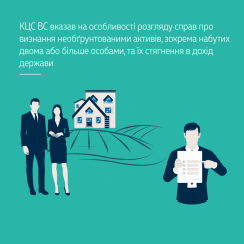Contact center of the Ukrainian Judiciary 044 207-35-46

The legislation does not stipulate the scenarios in which joint and several liability is triggered for the retrieval of unjustified assets to the state revenue or their corresponding value. If unjustified assets are acquired by two or more persons (i.e. there is a plurality of persons), their value is recovered as state revenue in certain proportions.
These conclusions were reached by the Civil Cassation Court of the Supreme Court.
In the case at hand, the SAPO prosecutor filed a lawsuit to declare the defendants' assets in the form of a residential building and a land plot unjustified and to recover them for the state.
In the circumstances of the case, the defendants held senior positions in the State Tax Service of Ukraine. The defendant entered into a loan agreement with a person who mortgaged a house and land to her. Some time later, by foreclosing on the mortgaged property, she acquired ownership of the residential building and land plot, which she subsequently sold.
The prosecutor pointed out that the defendant had acquired the assets in question in the interests of her co-defendant (brother), who was able to carry out actions identical to the right of disposal (communicating directly with the debtor, handing over written demands for the transfer of ownership of the mortgaged property, carrying out other actions to acquire the assets and hiring estate agents to find buyers). This indicates the defendant's involvement in the property. At the same time, according to their income tax returns, the defendants did not have sufficient funds at the time of signing the loan agreement. In fact, they did not lend real money, which means that the defendants did not use their legitimate income to acquire the assets.
The lower courts upheld the claim and recovered the value of the unlawful assets from the defendants jointly and severally for the benefit of the state.
After reviewing the cassation appeal, the Civil Cassation Court of the Supreme Court observed that there are two forms of confiscation used globally: personal confiscation (in personam) against an individual and confiscation against an object (in rem). Traditionally, in personam confiscation has been used in criminal proceedings (or those deemed to be criminal) and in rem - in civil proceedings.
The Ukrainian model of in rem confiscation is expressed in the construct of "unjustified assets", which has a rather atypical legal regime.
It is widely accepted in both private law doctrine and cassation court practice that in cases where an obligation is shared by multiple individuals, a partial obligation is formed. Therefore, in a partial obligation, the creditor is entitled to demand performance, and each debtor is obliged to perform their duty in equal portions. Instead, a joint and several or solidarity obligation (from the Latin solidus - whole, all) arises in cases established by contract or by law, in particular in the case of indivisibility of the subject of the obligation (Article 541 of the Civil Code of Ukraine).
The legislator did not specifically regulate cases where unjustified assets are acquired by two or more persons (i.e. multiple persons). Article 541 of the Civil Code of Ukraine, in the absence of a separate legal regulation, applies to the recovery of unjustified assets for the benefit of the state or the value of such assets. The legislation does not stipulate the scenarios in which joint and several liability is triggered for the retrieval of unjustified assets to the state revenue or their corresponding value.
In cases where assets are recognized as unjustified and require recovery for the benefit of the state, the plaintiff is obliged to provide factual data in the claim confirming the link between the assets and a person authorized to perform the functions of the state or local self-government. The claim should also demonstrate the groundlessness of the assets, which refers to the difference between the value of such assets and the legitimate income of such person as defined in part 2 of Article 290 of the Code. If the court determines that the plaintiff has provided sufficient evidence to establish the aforementioned facts, the defendant must rebut the unjustifiable nature of the assets, as stipulated under paragraph 2, part 2, Article 81 of the Civil Procedure Code of Ukraine.
In this case, the courts established that the assets were linked to the defendants. It was also established that the defendants did not lend any funds under the agreement that formed the basis of the defendant's acquisition of the assets, i.e. the defendants did not use their legitimate income to acquire the assets. Therefore, the courts' conclusion that the difference between the value of assets and legitimate income is not applicable is reasonable.
Having established that the disputed assets had left the defendants' possession, the lower courts reasonably concluded that the defendants were obliged to pay their value.
At the same time, the courts did not pay attention to the fact that the law does not establish cases of joint and several liability for the recovery of unjustified assets to the state revenue or the value of such assets. In these circumstances, the courts wrongly concluded that the value of the unjustified assets should be recovered jointly and severally from the defendants for the benefit of the state. Therefore, the challenged decision of the court of first instance, which was upheld by the appellate court in this part, should be modified in its operative part, and the court should order the recovery of the value of unjustified assets in shares from the defendants to the state.
The Resolution of the Supreme Court of 4 October 2023 in case No. 991/2396/22 (proceedings No. 61-8529св23) - https://reyestr.court.gov.ua/Review/114020811.
This and other legal positions of the Supreme Court can be found in the Database of Legal Positions of the Supreme Court - lpd.court.gov.ua/login.